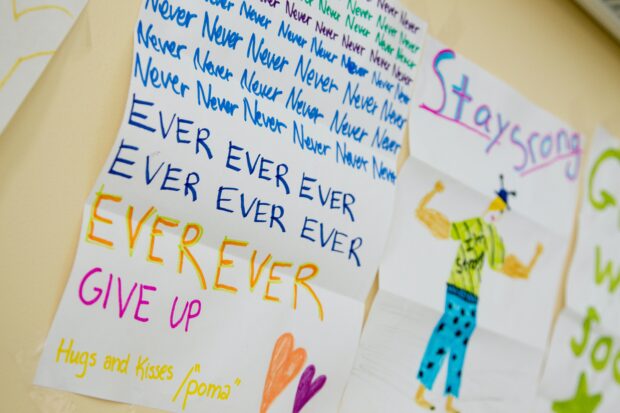
What were some of the main influences which helped you through that difficult time?
Nikki believes that a positive mindset is helpful. She was also very grateful for the support of friends, family and work colleagues which kept her spirits up. It kept her going, knowing that there were so many people thinking about her and wishing her well, not to mention all the lovely cards, flowers and other lovely goodies and treats she received.
Looking back to when you were suffering and undertaking the treatment, what activities became difficult to perform?
Everyone is different and it depends what treatment you have. Nikki had two lots of surgery after which she had to take two weeks away from work to recover and build up her strength with physiotherapy. Nikki had 2 types of chemotherapy over 18 weeks; the first made her very tired and nauseous, which is normal. The second type affected her much more severely physically in terms of pain, and that was difficult to manage.
Because Nikki only joined MOD in 2019 and her first day's absence fell two weeks before she’d served 1 years’ service, she had very little paid occupational sick leave available. As a result, she had to keep working to avoid being on a long period of half pay and unpaid leave.
What ways could a manager offer support to someone with cancer?
The first thing a line manager can do is to have a conversation with the person affected by cancer. It is important to remember that it isn’t just those who received the diagnosis who are affected. Really listen to what your colleague needs in terms of support from you and agree on a way forward which includes communication with the person concerned and others in the team.
How can people offer that support without coming across patronising?
Take the lead from the person who's had the diagnosis or who's family member or friend has had the diagnosis and don’t ask too many intrusive questions. Acknowledge the worry, upset or concern but try not to be patronising and overly positive.
Nikki suggests this is a good opening statement.“I know you've had this difficult news. I'd like to support you, so let me know what I can do.”
She also says that working and carrying on being as normal as possible is important. It can provide stability and other things to think about as well as having regular contact with others outside of the medical team.
If someone is having a particularly difficult day, try “I’m sorry you’re having a rough day, we’re here with you” rather than – “chin up – you’re doing really well”.
Did you get the necessary support in the workplace that you needed after that or did you think they could have been some more done?
When Nikki’s physical treatment stopped, she felt like a train hitting the buffers. That’s when the mental health issues kicked in. People often made assumptions that because active treatment was completed, and she had been declared “No Evidence of Disease” that she was ‘back to normal’. That was hard for Nikki to navigate. “Because once you've had cancer, you're never back to how you were before.”
Nikki was supported by her immediate colleagues but felt that more could be done in terms of navigating policies through and after treatment.
She did use the employment assistance program and arranged counselling through that.This is one of the reasons that Nikki and her colleagues set up the Defence Cancer Support Network to help support all those who are affected by cancer: both during and after treatment. There is also a cross government Cancer Support group, easily accessible online. Macmillan is a good one for line managers, because it's got the line manager information. People should also be aware that GP and local primary care services can offer support as well.
We’d like to offer our immense thanks to Nikki for sharing her experience, and we hope it has been useful to our readers in looking at how to manage cancer in the workplace.
GSP is keen to feature inspirational work colleagues from all backgrounds within the security profession. If you or someone you work with has an interesting story to share please contact governmentsecurity@cabinetoffice.gov.uk.
